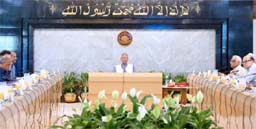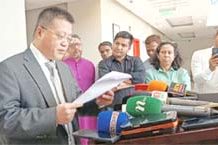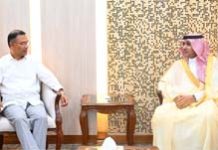C T Online Desk: The approval came during the council’s 28th meeting, held at the Chief Adviser’s Office in Tejgaon on Thursday. Chief Adviser Professor Muhammad Yunus chaired the session.
At the same meeting, the council formed a committee to restructure and review the draft of the Welfare and Rehabilitation of Martyred Families and Injured Students and Citizens of the July Uprising Ordinance, 2025.
This committee comprises advisers from the ministries of public works, energy, local government, health and fisheries. The Ministry of Liberation War Affairs will provide secretarial support to the committee.
The meeting also reviewed a report submitted by the advisory committee on the formulation of the National Gene Bank Management Policy, 2024. The report was accepted.
It was found that the construction of the National Gene Bank and its ancillary infrastructure in Savar had been carried out without a proper assessment of its necessity.
To ensure optimal use of the infrastructure without increasing government expenditure, another committee was formed, led by the adviser for the Ministry of Planning, and including advisers from the ministries of agriculture, education, health and environment. The Ministry of Science and Technology will provide secretarial support to this committee.
Regarding the National Urban Policy 2025, the council decided that the policy will be restructured by a committee headed by the member of the Physical Infrastructure Division of the Planning Commission.
The committee will include representatives from the ministries of public works and environment, as well as the secretary of the Local Government Division. The Local Government Division will provide secretarial support. The restructured draft must be placed before the Advisory Council again.
The council also approved a revised draft of the Dredging and Dredged Material Management Policy, prepared in Bangla and subject to further refinements. Key features of the policy include:
(a) Ensuring planned, efficient, and integrated management of dredging operations and optimal use of dredged material.
(b) The policy will apply to all relevant ministries, divisions, and their affiliated agencies involved in dredging operations—whether conducted by the public sector, private sector, or through joint initiatives.
(c) It highlights environmentally friendly management of dredged materials, enhancement of river water-holding capacity, development of fisheries, agriculture and irrigation systems, conservation of wetland biodiversity, and preservation of environmental balance.
(d) The policy incorporates the necessary administrative and legal frameworks for proper implementation and enforcement.
(e) It does not conflict with any existing laws or regulations.
The meeting also decided to update the Sand Quarry and Soil Management Rules 2011, enacted under the Sand Quarry and Soil Management Act 2010.
New provisions include conducting fresh hydrographic surveys before issuing leases for sand quarries based on outdated surveys, halting sand extraction after sunset, and using illegally extracted sand in public construction projects instead of selling it through auctions.
The Ministry of Land will take the necessary steps in this regard.
















